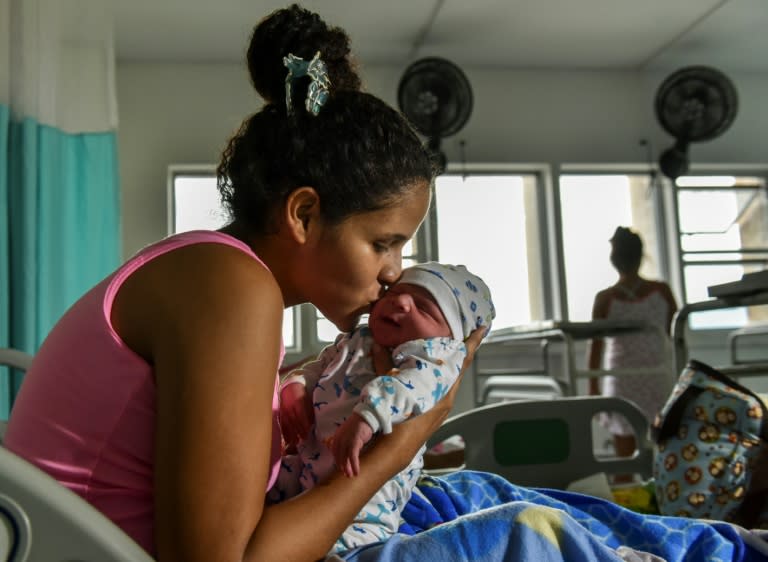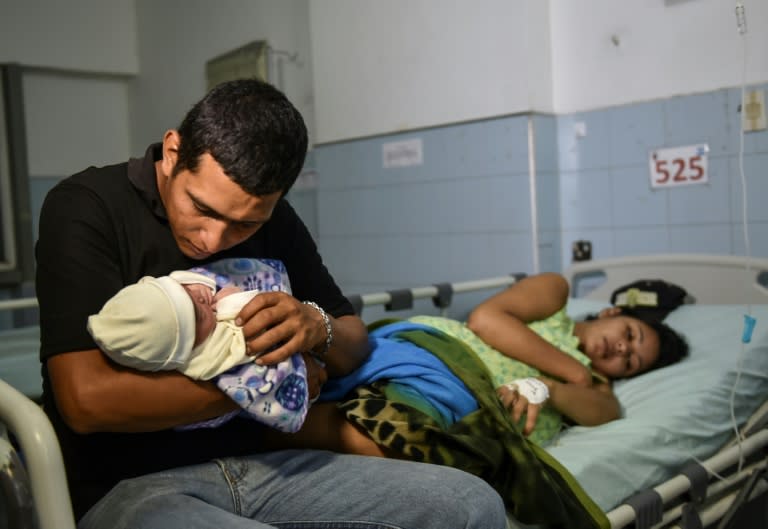Facing life or death, pregnant Venezuelans flee to Colombia
Dayana Zambrano's belly is remarkably small for a woman nearly nine months pregnant. Malnutrition suffered due to Venezuela's downward economic spiral forced her to move to Colombia for medical attention -- so she could give birth without it becoming a matter of life and death. She journeyed more than 1,200 kilometers (750 miles) by bus from eastern Venezuela's Ciudad Bolivar to reach Cucuta, Colombia for medical care, one of many pregnant Venezuelans looking outside their crisis-stricken country's borders for vital care. She recently arrived at the university hospital Erasmo Meoz with an excessively low weight for her advanced stage of pregnancy. "Thank God, my weight increased and the doctor told me the baby is doing well," the 21-year-old woman told AFP. "He just needed to grow his lungs a little bit, because they were tiny." Zambrano's decision to flee her country reflects the increasingly dire situation in Venezuela. Amid the South American country's turbulent political and economic crisis, infant mortality reached 30.12 percent in 2016, with nearly 11,500 deaths of children between zero and one year old. The maternal mortality rate has exploded to 65 percent, according to the Venezuelan Ministry of Health. - Spiraling costs - Zambrano's baby developed at an unusually slow rate because of his mother's malnutrition: "I did not eat three times a day," she said, opting instead to feed her one-year-old daughter. During her exhausting trek to Colombia, she began to bleed, she said, due to complications with the placenta. Pale and petite, she is nevertheless feeling better, having reached 34 weeks of pregnancy in a public hospital where her care is cost-free. In the neighboring room, Joselys Canas, 19, is relieved that her son was born in Cucuta, where she settled with her mother just over a year ago after leaving Maracaibo, a Venezuelan state that borders Colombia. She said she was "very lucky, especially because there are no medicines there -- there's nothing." The number of Venezuelan patients at the hospital "has increased exponentially," said its director, Juan Agustin Ramirez. Between September and December 2015, 655 Venezuelans were treated there, compared to 2,300 in 2016 and 1,400 already this year -- generating a cost of more than $1.6 million, Ramirez said. - Chronic shortages - Pregnant women arrive without having received prenatal checks, he said, meaning they are automatically classified as at-risk patients. "If we end up with a tragedy of great proportions -- a displacement of Venezuelans -- we will need to ask for international aid," Ramirez said, to establish field hospitals for refugees. If Marbella Nino, 22, had delivered Joshier in Venezuela, she would have had to purchase all the surgical equipment for her C-section. She could not find the supplies, she said. But even if she had, the young mother said: "Truthfully, I don't have the money to buy it." The Colombian hospital even gave her diapers for her baby, a rare find on the other side of the border. "I preferred to give birth here, where I could be vaccinated and better monitored," she said. Nino is preparing to return to Venezuela in three weeks, and now worries of her country's chronic shortages of food and medicines. "Imagine him getting sick there!" she said of her son.




